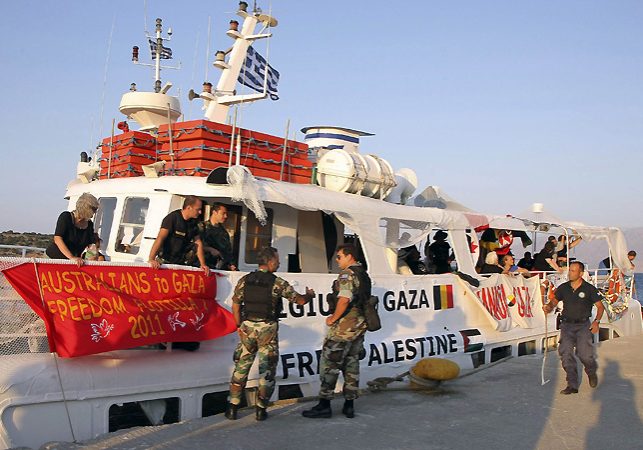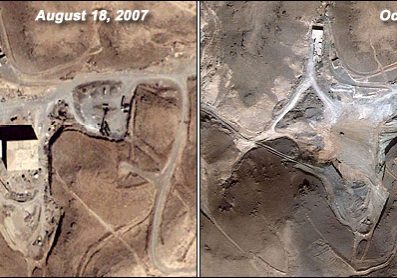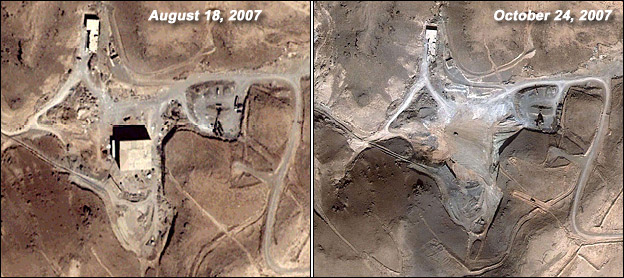
Déjà vu in Hama and Across Syria
July 6, 2011 | Geoffrey Levin
In February 1982, over 29 years ago, Syria’s President Hafez Assad sent his younger brother to ‘deal with’ an uprising in a Sunni-majority city called Hama. Between 10,000 and 30,000 civilians died, killed for attempting to topple the Alawite dictator that reigned for over a decade.
Today history appears to be repeating itself, in the same city but with a different Assad. Reports today that 16 civilians in Hama were killed by President Bashar Assad’s forces can be added to the already 1,300 dead since the current Syrian uprising began in March, 130 in Hama alone. These numbers are much smaller than the estimates from 1982, which numbered in the tens of thousands. Today, rather than President Hafez Assad, it is his son Bashar who presides over the current massacre in Hama, where his current victims are quite literally the children of those killed by Hafez.

The courage to speak out
July 6, 2011 | Daniel Meyerowitz-Katz
Ray Hanania, a former head of the Palestinian American Congress and recent member of the national board of the American Arab Anti-Discrimination Committee, has recently written about the discrimination that he has suffered throughout his involvement in Arab public affairs…

More flotilla capers
July 5, 2011 | Daniel Meyerowitz-Katz
Proving that the flotilla organisers are nothing if not persistent, the Canadian flotilla ship, the Tahrir, which had been prevented from leaving a harbour in Crete to sail for Gaza, issued the following press statement last night:
With the support of Greek civil society and people from all around the world the Tahrir is casting off from Greece today….”
Shortly afterwards, however, this news item was making headlines:

The IAEA: countering proliferation at its convenience
July 5, 2011 | Daniel Meyerowitz-Katz

Four long years after Syria’s alleged nuclear program came to a sudden halt due to an [alleged] Israeli air strike, the international community is taking the Assad regime to task. As AP reports, the International Atomic Energy Agency has referred the program to the UN Security Council and it will be discussed next week. As for the delay, the report said that the IAEA had, in fact, been trying to gain access to the site since 2008…

Amnesty International’s Moral Decline
July 5, 2011 | Sharyn Mittelman
Amnesty International (AI), the world’s largest human rights organisation, is celebrating its 50th anniversary. However new reports suggest that the once respected moral watchdog has lost sight of its original principles.
One of the greatest scandals to have rocked AI was in February 2010 with the suspension of highly respected, lifelong human rights activist Gita Sahgal who was the head of its women’s rights division. Sahgal was suspended after she was quoted by The Sunday Times criticising AI for its high-profile associations with Moazzam Begg, the Director of a campaign group called Cageprisoners, who she referred to as “Britain’s most famous supporter of the Taliban”. In April 2010, AI fired Sahgal due to ‘irreconcilable differences’.

Greek-Israeli Relations at historic high
July 5, 2011 | Geoffrey Levin
In a sign of growing ties, the Israeli and Greek air forces have held a fourteen-day cooperative drill at Greece’s Larisa Air Base. Joint drill participants included several elite Israeli squadrons, the IDF’s top rescue unit, and their equivalents in the Greek military.
The exercise took place as Greece has been working to stop the second Gaza flotilla from leaving its ports for Gaza. As reported in a recent post by Daniel Meyerowitz-Katz, Greek authorities arrested the captain of one boat several days ago for failing to ensure that the boat had proper safety equipment. More recently, the Greeks proposed a compromise, accepted by the Israeli government, which would involve the Greek government transporting the flotilla’s aid to Gaza under UN supervision.

Flotilla activists drop all pretence of “humanitarian” mission, declare victory and plan to test Israeli airport security
July 4, 2011 | Daniel Meyerowitz-Katz
As AIJAC has been reporting, the planned flotilla to Gaza has been facing a number of obstacles in recent weeks. In the wake of the Greek decision over the weekend to prevent any vessels planning on sailing to Gaza from leaving Greek ports, the flotilla organisers appear to be looking to shift tack, dropping all pretences that they may have had of bringing any humanitarian aid to Gaza.
While it will not revoke the order preventing the ships from leaving, the Greek Government has offered to transfer all humanitarian aid that was on board the flotilla to Gaza through other means; this offer was accepted by the Israeli Government but the flotilla organisers rejected it outright, opting instead to try and pressure the Greek Government into reversing its policy. Similarly, Israeli authorities offered last year to…

Journalistic ethics and flotilla sabotage claims
July 4, 2011 | Tzvi Fleischer
Following up on Daniel Meyerowitz-Katz’s post yesterday – now that Turkish authorities have found baseless widely-reported claims by leaders of the Gaza flotilla that an Irish boat was sabotaged by Israel in a Turkish port, it is worth noting that the Australian media has, to date, largely failed to report this (one exception was The Australian today.).
In terms of journalistic ethics, this is particularly problematic with respect to the Sydney Morning Herald.

Time for another look at banning Hizb-ut-Tahrir?
July 4, 2011 | Sharyn Mittelman
Concerns about the operations in Australia of radical Islamist group Hizb ut Tahrir’s (HT) should be renewed yet again following a conference hosted by the group on July 3, at Lidcombe, which drew about 1000 people. The fundamentalist group called for the establishment of a caliphate stretching from the Middle East to Indonesia.
The Sydney Morning Herald reported that at the conference, Muslims in Australia were urged to join the uprisings that have toppled regimes across the Middle East, to renounce moderate forms of the religion and to reject democracy.

Gaza’s shortages of medicines
July 4, 2011 | Allon Lee
It is often pointed out that there are shortages of medicines and medical supplies in Gaza, implying that this is the result of Israel’s blockade. But while there are such shortages, they actually have almost nothing to do with either Israel or the blockade. Rather, they are primarily the result of an internal Hamas-Fatah dispute.
- 1
- 2
- 3
- 4
- 5
- 6
- 7
- 8
- 9
- 10
- 11
- 12
- 13
- 14
- 15
- 16
- 17
- 18
- 19
- 20
- 21
- 22
- 23
- 24
- 25
- 26
- 27
- 28
- 29
- 30
- 31
- 32
- 33
- 34
- 35
- 36
- 37
- 38
- 39
- 40
- 41
- 42
- 43
- 44
- 45
- 46
- 47
- 48
- 49
- 50
- 51
- 52
- 53
- 54
- 55
- 56
- 57
- 58
- 59
- 60
- 61
- 62
- 63
- 64
- 65
- 66
- 67
- 68
- 69
- 70
- 71
- 72
- 73
- 74
- 75
- 76
- 77
- 78
- 79
- 80
- 81
- 82
- 83
- 84
- 85
- 86
- 87
- 88
- 89
- 90
- 91
- 92
- 93
- 94
- 95
- 96
- 97
- 98
- 99
- 100
- 101
- 102
- 103
- 104
- 105
- 106
- 107
- 108
- 109
- 110
- 111
- 112
- 113
- 114
- 115
- 116
- 117
- 118
- 119
- 120
- 121
- 122
- 123
- 124
- 125
- 126
- 127
- 128
- 129
- 130
- 131
- 132
- 133
- 134
- 135
- 136
- 137
- 138
- 139
- 140
- 141
- 142
- 143
- 144
- 145
- 146
- 147
- 148
- 149
- 150
- 151
- 152
- 153
- 154
- 155
- 156
- 157
- 158
- 159
- 160
- 161
- 162
- 163
- 164
- 165
- 166
- 167
- 168
- 169
- 170
- 171
- 172
- 173
- 174
- 175
- 176
- 177
- 178
- 179
- 180
- 181
- 182
- 183
- 184
- 185
- 186
- 187
- 188
- 189
- 190
- 191
- 192
- 193
- 194
- 195
- 196
- 197
- 198
- 199
- 200






